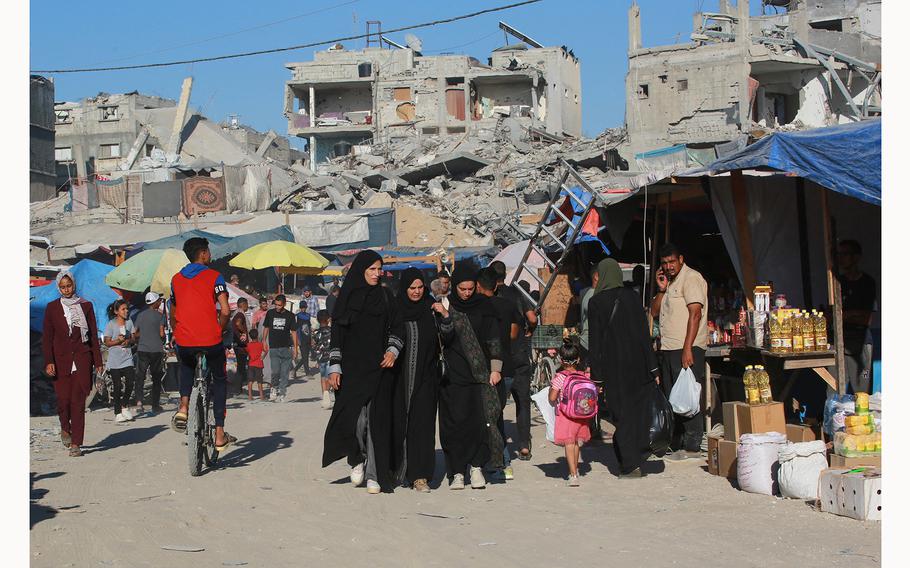
Palestinians gather at a makeshift market set up along a street devastated by Israeli bombardment in the town of Bani Suhayla near Khan Yunis in the southern Gaza Strip on July 17, 2024. (Bashar Taleb/AFP/Getty Images/TNS) (Bashar Taleb/AFP)
(Tribune News Service) — An Israeli delegation led by the country’s intelligence chief visited Egypt, seeking to make progress on long-stalled talks over a possible Gaza truce, but returned with no immediate sign of a breakthrough.
Saturday’s visit was aimed at pursuing negotiations for a cease-fire in the almost 10-month-old war with Hamas, which could free some hostages held by the Iran-backed militant group, Israeli officials said, asking not to be identified citing the sensitivity of the matter.
The delegation returned to Israel later in the day, one of the officials said, without providing details.
Israeli Prime Minister Benjamin Netanyahu’s office, which oversees Mossad, did not comment on the trip by David Barnea, the spy agency’s director. Authorities in Egypt, which has acted as a key mediator in Israel-Hamas negotiations, weren’t available for comment.
On Friday, Netanyahu’s office said Israel and Hamas remained divided over what a possible cease-fire would look like.
The proposed arrangement, which is backed by the U.S., could help reduce the scale of reprisals that Hamas, its ally Hezbollah and their sponsor Iran have threatened for the killing this week of senior militants in Beirut and Tehran.
But Israel’s demonstration of willingness to return to cease-fire talks also is a bold move because Iran and its proxies blame it for killing a top negotiator for their side.
Ismail Haniyeh, the Palestinian faction’s political leader, was killed in the Iranian capital Tehran this week. Both Hamas and the Islamic Republic have blamed Israel for Haniyeh’s assassination.
Israel hasn’t acknowledged responsibility for his death, though it has vowed since the outset of the war to destroy the militant group’s leadership.
Opposing demands
Israel maintains its forces should remain stationed along the border that separates the Palestinian enclave from neighboring Egypt even after a possible truce deal with Hamas. The Jewish state also demands the creation of a mechanism to prevent Hamas fighters from returning to northern Gaza.
Another sticking point is the number of hostages to be released by the group, which is believed to be holding over 100 people captive. Hamas, designated a terrorist organization by the U.S., raided southern Israel on Oct. 7, killing around 1,200 people and kidnapping around 250 others.
The militant group wants any truce deal to eventually bring to an end the war in Gaza, where more than 39,000 Palestinians have been killed since the beginning of the war, according to Hamas-run health ministry.
Israel has been on alert for a sharp escalation of tensions with Iran and the militant groups backed by Tehran following this week’s assassinations. Hezbollah has pledged to retaliate after Israel assassinated Fuad Shukr, a senior commander of the militant group, in Lebanon on Tuesday.
©2024 Bloomberg L.P.
Visit bloomberg.com.
Distributed by Tribune Content Agency, LLC.